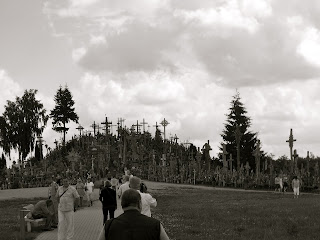I'm spending the month of July in Klaipeda, Lithuania and I will be blogging the experience. Some posts will be intentional but a lot of it will be stream of consciousness. I chalk up any terrible culturally insensitive things I may say to jetlag. Enjoy the journey with me!!
 Imagine that your entire life you feel the identity you've been given is wrong. You spend your days being educated under one system that drills you constantly on what your supposed to be. You learn one common language, you learn one common history, you're told that the world is supposed to look and act a specific way.
Imagine that your entire life you feel the identity you've been given is wrong. You spend your days being educated under one system that drills you constantly on what your supposed to be. You learn one common language, you learn one common history, you're told that the world is supposed to look and act a specific way. Imagine you had a nagging suspicion that this world wasn't right. No matter how often the authority figures around you assured you that this is the way things should be, YOU feel that its not right. Perhaps the more you try and push against the way your told this world should be the more resistance you get. Friends begin to reject you, teachers begin to eye you warily, people you trust whisper that if you don't stop thinking the way your thinking you might be shunned. That job your supposed to get might disappear. But you don't care, and you're desperate to find a way to express your rejection of this reality boldly and evocatively. Your tired of the suffocating existence this world forces you to accept.
You begin to hear rumors of a place...a place that passionately and clearly declares that this reality is
 a sham. A place that claims this reality holds no exclusivity over anyone's existence. Wouldn't you want to find this place? Wouldn't you want to do something to participate in the revolutionary statement it made?
a sham. A place that claims this reality holds no exclusivity over anyone's existence. Wouldn't you want to find this place? Wouldn't you want to do something to participate in the revolutionary statement it made?This scenario is the basic story of "The Hill of Crosses." No one really knows exactly how it was started. There's a few stories that go back to 1850. Originally it was believed that the son of a local merchant promised to plant a cross on a hill outside of Šiauliai. When the boy was healed, he obliged his promise.
Lithuania, through much of its history, has fought constantly for cultural relevance. First the Poles, and then the Russians worked hard to absorb Lithuania. While the Poles favored language dominance and reserving good land for Polish nobility, the Russians had a tendency to ship anybody who complained too loudly off to Siberia. Lithuanian culture was continually struggling for its own survival. After the failed Lithuanian insurrection against Russia in the 1860s more crosses began to appear.
The Hill of Crosses gained new relevance during the Soviet occupation. The Soviets deported the Lithuanian population in earnest. Schools were set up to erase the Lithuanian language and culture, and Russian transmigrants were flooded into the country in an effort to overwhelm the natives. In 1961 the Hill of Crosses was labeled an undesirable place by the communist party and bulldozed. Still...the crosses kept returning and it was bulldozed several times over the next 2 decades.
The Hill of Crosses is an incredible reminder that belief matters. To quote Rob Bell, "....some things are true, but some things are TRUE." There may be forces or circumstances that continually reinforce the idea that this reality is all you have, or that things, no matter how hopeless can never change. But this reality pales in comparison to the signs of reality just beneath the surface of life. The Hill of Crosses, in its proper context is a stark reminder and a peephole into that truth.
More pictures of the hill of crosses can be found here.



0 comments:
Post a Comment